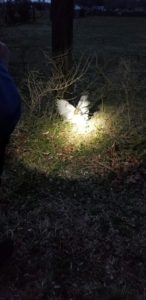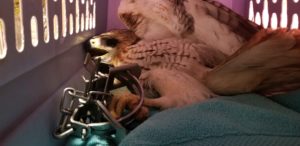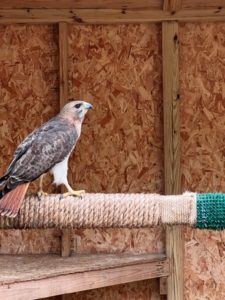
In early March our Wildlife Hospital admitted a Red-tailed Hawk with a very shocking and sad story. Most injuries that are caused by humans are accidental, but every once in a while we admit animals that were purposely harmed. These cases can be extremely upsetting to the people who find and treat them, and sadly there are times when those animals cannot be saved or don’t survive due to the trauma that they have endured. Thankfully, this Red-tailed Hawk made a full recovery leading to a successful release back to his home!
The Red-tailed Hawk came from Atlantic County after being found ensnared in a leg-hold trap for an unknown amount of time. While the leg-hold trap was likely not set to catch a bird of prey, like most traps it will catch anything that sets it off. As with most entanglement situations, this bird spent time struggling to free itself under a great deal of stress. Prolonged stress, dehydration, and starvation in these situations can be lethal, but this Red-tailed Hawk was lucky to be found in time and brought to Cedar Run for care.
 Leg-hold traps can cause serious physical damage to an animal including lacerations, muscle damage, and nerve damage that could potentially lead to paralysis. In the struggle to free themselves, animals will self-mutilate or inadvertently cause more damage in their state of panic. This Red-tailed Hawk was “lucky” that it came to us with lacerations, muscle damage, and minor nerve damage to its leg, all of which we were able to rehabilitate over time. In addition, the bird was suffering from shock, emaciation, and dehydration.
Leg-hold traps can cause serious physical damage to an animal including lacerations, muscle damage, and nerve damage that could potentially lead to paralysis. In the struggle to free themselves, animals will self-mutilate or inadvertently cause more damage in their state of panic. This Red-tailed Hawk was “lucky” that it came to us with lacerations, muscle damage, and minor nerve damage to its leg, all of which we were able to rehabilitate over time. In addition, the bird was suffering from shock, emaciation, and dehydration.
 After two months of treatment and recuperative time in our pre-release flight enclosures, we were so happy to release this Red-tailed Hawk back to the wild! Seeing these situations breaks the hearts of our staff and volunteers, but we are thankful to be able to give them the second chance that they deserve. The hawk was more than ready to say goodbye to us as you can see in his release video!
After two months of treatment and recuperative time in our pre-release flight enclosures, we were so happy to release this Red-tailed Hawk back to the wild! Seeing these situations breaks the hearts of our staff and volunteers, but we are thankful to be able to give them the second chance that they deserve. The hawk was more than ready to say goodbye to us as you can see in his release video!
Like other wild bird species, Red-tailed Hawks are protected under the Federal Migratory Bird Treaty Act of 1918. Purposely harming a bird in this way is a federal offense and not taken lightly by Fish and Wildlife. Additionally, steel-jawed leg-hold traps have been banned in the state of New Jersey since 1985. As such, Cedar Run’s Wildlife Rehabilitation staff assisted NJ Fish and Wildlife in an investigation regarding this case. While we cannot disclose information on the outcome of this case, we are grateful to have committed Fish and Wildlife Conservation Officers who work hard to find justice in these horrible situations.


